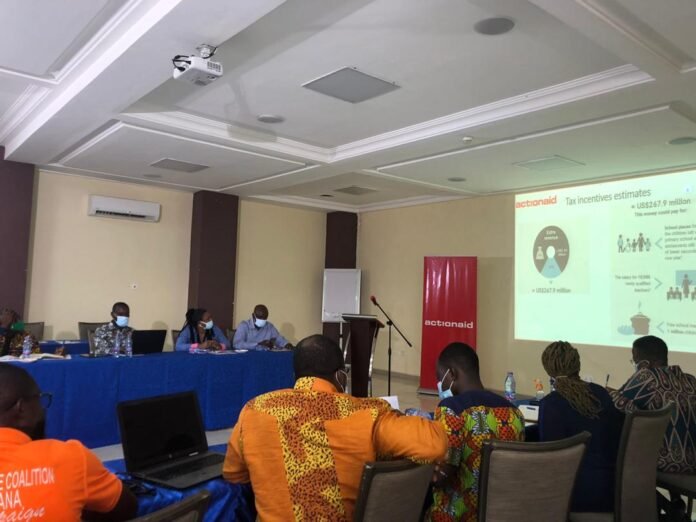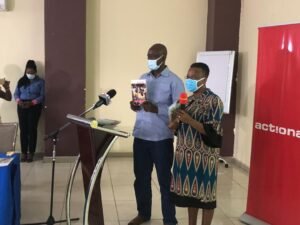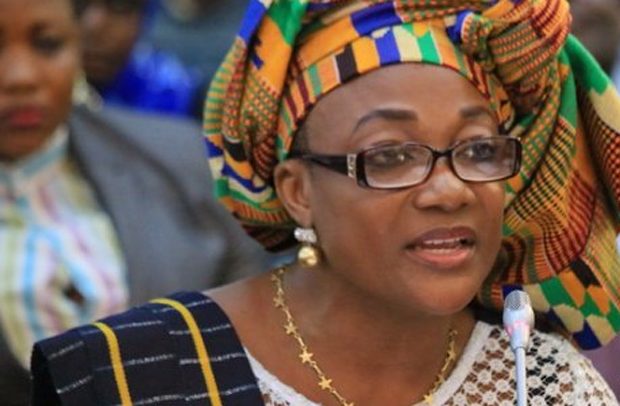
Educationists in the country are lamenting over what they call the over-generosity of government’s tax incentives given to foreign investors, noting that these monies lost could provide education for over 950,000 basic school pupils.
A study by ActionAid Ghana on financing education in Ghana, revealed that Ghana has lost $901.1 million as tax incentives through parliamentary tax waivers alone to corperations between 2018 and 2020 and about $657million through the GIPC investment in 2018.
The report titled ‘financing education in Ghana: how progressive taxation can increase the government’s spending on public basic schools and reverse education privatization’ was launched on Monday November 17 in Accra.
The report noted that government expenditure allocation to the education sector is increasingly looking bleak, shifting away from the GPE target of 20%.
“With an annual average of GHC 4.198 million funding gap, according to the GPE benchmark, the measure of underperformance and delivery in the education sector is adequately measured. It showed a fluctuating trend between 13 percent and 16 percent (2016 – 2021), with its highest peak at 16 percent in 2019.”

It added that “20 percent of the $901 million potential revenues lost to tax incentives could provide extra 950, 527 places for pupils in schools or more school infrastructure with the potential of 10,376 classrooms for pupils in Ghana.
Policy Analyst with Tax Justice Coalition Bernard Akaba spoke to Starrfm.com.gh on the sidelines of the launch “we also know that our country has a need and if we look at the education sector, basic education particularly is under-funded and has been underfunded over years. So, we can make the case that it’s not everything that we have to give away.”
He went on “we can make the case that we need funds for our basic education, so we are not going to give blanket tax exemption incentives. There are some that we have to reserve for our schools. If we look at Getfund for instance, Getfund was a consensus kind of tax that we all agreed is important for our education sector, why should government always give Getfund away as a tax incentive.“
“Government can retain that for the education sector irrespective of what it is. While incentives may be good for some spect of our economy, its not all of them that are important. Government can negotiate better and lower the incentives that are given away because most of our children are out of the schools and we need to find a way to fund their education,” he added.
Recommendations
ActionAid recommended in the report that Government must first improve domestic resource mobilization by curbing tax leakages (tax incentives and illicit-flows) and then allocating 20% of such savings to education following equity criteria.
It further recommended that “because it is possible to save $180.2 million from the tax incentives only of we negotiated well.”
ActionAid Ghana concluded that “the government’s elaborate VAT exemptions are depriving the state of needed revenues, VAT exemptions should be more effectively targeted to lower-income households or to sectors that generate positive social or economic externalities
A survey was conducted in 150 households, 25 schools in Ga south municipality to amongst other things find out the cost associated with education both in public and private schools to inform the government’s education budget and assess the progress that has been made on education and her challenges.”
About ActionAid
ActionAid is a non-governmental organization working with over 15 million people in about 45 countries towards a world free from poverty and justice. ActionAid works in partnership with more than 2,000 locally-based organizations around the world.
In Ghana, ActionAid has implemented the Tax Privatisation and the Right to Education project, which seeks to achieve better and fairer financing for free public education for all.
Under its over aching human rights-based development strategy, ActionAid Ghana works under four thematic education programs: Promoting rights in schools; financing education; the girls’ education and violence program and; empowerment through literacy program.
Source: Ghana/Starrfm.com.gh/103.5FM



